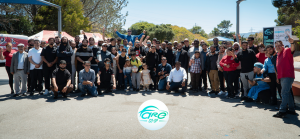From Vision to Reality: Fare Co-op Rises to Become America’s 3rd Largest Fully Licensed Rideshare in Less Than 12 Months
Fare Co-op is officially America’s 3rd rideshare company. The duopoly is broken. The future belongs to the drivers.
SAN MATEO, CA, UNITED STATES, August 19, 2025 /EINPresswire.com/ -- The future of rideshare has arrived—and it doesn’t belong to Wall Street, it belongs to the drivers. Fare Co-op, the revolutionary driver-owned federated rideshare cooperative, has officially launched in Georgia and Florida after securing the necessary state licenses. This breakthrough makes Fare Co-op the first and only rideshare platform after Uber and Lyft to operate in three or more states—shattering barriers and cementing its place as America’s 3rd fully licensed and insured rideshare company in less than a year of operations.Airports & Exclusive Partnerships
Fare Co-op secured permits at LAX and Long Beach Airport, officially launching at LGB on August 1, 2025, with San Francisco Airport on its way. Earlier this year, Fare Co-op also announced exclusive partnerships with the Dolby Theatre and TCL Chinese Theatre in Hollywood, to be going live in the Fall, cementing its presence at two of the most iconic landmarks in Los Angeles.
The 777 BBQ: A Celebration of Explosive Growth
With momentum surging, Fare Co-op celebrated its historic achievements at the first-ever 777 BBQ Celebration on August 5, 2025 in San Mateo. Sponsored by Saba Farm, the event marked the cooperative surpassing an extraordinary trifecta: 7,000 customers, 7,000 drivers, and 7,000 total rides in California. The celebration was organized by Bay Area President Malek Nasher, a co-founder, who was also appointed to the role of CEO of the cooperative’s new buying group for drivers thanks to his incredible work. The event drew hundreds of drivers, their families, and Fare Co-op customers, creating a powerful showcase of community, ownership, and momentum behind the movement.
For the past nine months, Fare Co-op’s managing co-founders have worked tirelessly to build a foundation in California, establishing active chapters across multiple cities while continuing to develop operations and procedural bylaws in anticipation of the cooperative’s first Annual General Meeting (AGM).
The Referral Revolution
At the core of Fare Co-op’s explosive rise is its referral program—a game-changer in the rideshare world. By allocating 25% of net profits directly to referrals, both drivers and riders earn lifetime commissions for building the movement.
This unprecedented profit-sharing system has been the driving force behind Fare Co-op surpassing 7,000 total rides in California alone. More than just marketing, the program redefines growth by ensuring that the community—not corporate investors—reaps the rewards.
What’s Next: Oregon and Arizona
Fare Co-op isn’t stopping. With launches in Oregon and Arizona slated in the coming weeks, the cooperative is on track to expand its driver-ownership model into even more states—proving that this is no regional experiment, but a national movement rewriting the rules of rideshare.
Driver Success Stories & The Road Ahead
At the 777 BBQ, three groundbreaking initiatives were also announced:
1. Rideshare Car Rental Program – Affordable, driver-first alternatives to exploitative corporate rental schemes.
2. Driver & Business Buying Group – A cooperative purchasing power initiative where drivers vote on products (from auto parts to dashcams) to slash costs and maximize value.
3. FareEats– Fare Co-op’s upcoming food delivery platform, allowing businesses to join as full members for a service fee as low as 5% (compared to the 20–35% charged by competitors), while ensuring drivers keep 90% of the delivery fees paid by customers.
A Proud Moment for the Movement
“In just nine months, Fare Co-op has risen to become America’s 3rd largest rideshare company—something no other startup, cooperative or corporate, has ever achieved. By giving drivers 85% of profits, ending surge pricing, saving riders 20% on average, and fueling growth with a referral program that shares 25% of net profits, we’ve turned vision into reality. And soon, through our cooperative model, drivers will even own the very driverless vehicles that were meant to replace them. This is proof that drivers can build, own, and scale a national rideshare movement.”
— AJ Attia, Chairman of Fare Co-op
About Fare Co-op
Founded in 2021, Fare Co-op is a driver-owned rideshare cooperative federation that gives drivers up to 85% of the profits from every fare, while reinvesting profits back into members and their communities. Now operating in California, Georgia, and Florida, and with permits at LAX and Long Beach Airport, Fare Co-op is pioneering a new rideshare era: fair, sustainable, and owned by the drivers themselves.
Danny Golnik
Fare Co-op
info@fare.coop
Visit us on social media:
LinkedIn
Instagram
YouTube
TikTok
X
Legal Disclaimer:
EIN Presswire provides this news content "as is" without warranty of any kind. We do not accept any responsibility or liability for the accuracy, content, images, videos, licenses, completeness, legality, or reliability of the information contained in this article. If you have any complaints or copyright issues related to this article, kindly contact the author above.
Programmatic Advertising Market to Hit USD 3185.5 Billion By 2034, Maximizing Reach with Programmatic Advertising
CORILLO Announces Global Expansion and AI-Powered Music Marketing Tools to Transform Independent Artist Development
RadSite Recognizes Remote Scanning Workgroup Members for Contributions to New Accreditation Standards
Więcej ważnych informacji
 Jedynka Newserii
Jedynka Newserii

 Jedynka Newserii
Jedynka Newserii

Prawo

Kolejne polskie miasta chcą być przyjazne dzieciom. Planują stworzyć najmłodszym dobre warunki do rozwoju
Cztery miasta w Polsce posiadają tytuł Miasta Przyjaznego Dzieciom nadany przez UNICEF Polska. Dziewięć kolejnych miast czeka na certyfikację, a w ostatnich miesiącach do programu zgłosiło się kilka następnych. Na całym świecie inicjatywa została przyjęta już w ponad 4 tys. samorządów, a w Hiszpanii objęła połowę dziecięcej populacji miast. Program UNICEF-u ma na celu zachęcenie włodarzy do traktowania najmłodszych obywateli w sposób podmiotowy, respektowania ich praw i zaproszenia ich do współdecydowania o przyszłości.
Przemysł
W ciągu roku w Polsce ubyło 500 przedsiębiorstw odzieżowo-tekstylnych. Problemem są spadki zamówień z Europy Zachodniej i wzrost kosztów

Wartość rynku odzieżowego w Polsce wynosi 66,9 mld zł, z czego 10 mld zł to wartość krajowej produkcji – wynika z danych PIOT. Od czasu pandemii branża mierzy się z szeregiem wyzwań, wśród których najpoważniejsze to wzrost kosztów pracy i produkcji, przerwane łańcuchy dostaw i spadek zamówień – zarówno w kraju, jak i za granicą, a także wzrost nieuczciwej konkurencji na rynku, czyli głównie importu z Chin. Skala wyzwań sprawia, że w ubiegłym roku z rynku zniknęło 500 firm. Producenci odzieży apelują do rządu o wsparcie.
Handel
D. Obajtek: Orlen powinien być o 30–40 proc. większą spółką. Byłoby to z korzyścią dla konsumentów

Orlen jest największym polskim przedsiębiorstwem. Jego przychody ze sprzedaży w 2024 roku wyniosły blisko 295 mln zł, a rok wcześniej – ponad 372 mln – wynika z raportu Rzeczpospolitej „Lista 500”. W ubiegłorocznym rankingu Fortune 500 uwzględniającym największe korporacje znalazł się na 216. miejscu na świecie i 44. w Europie. Według Daniela Obajtka, europosła PiS-u i byłego prezesa Orlenu, spółka powinna jeszcze urosnąć, tym samym gwarantując konsumentom szereg korzyści, a także przyspieszać inwestycje m.in. w obszarze petrochemii i energetyki zero- oraz niskoemisyjnej.
Partner serwisu
Szkolenia

Akademia Newserii
Akademia Newserii to projekt, w ramach którego najlepsi polscy dziennikarze biznesowi, giełdowi oraz lifestylowi, a także szkoleniowcy z wieloletnim doświadczeniem dzielą się swoją wiedzą nt. pracy z mediami.









.gif)

 |
| |
| |
|